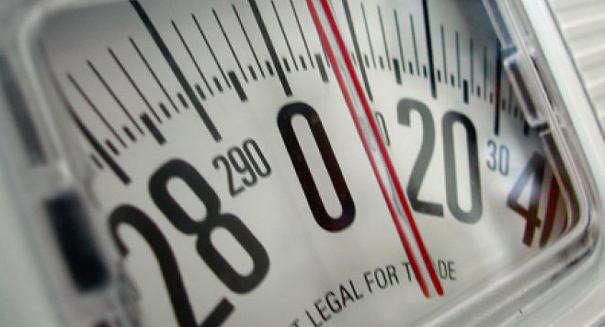
Letting it all go while on vacation may be a pleasant way to relax, but according to new research, even a small amount of indulgence can have a noticeable impact on health — gaining just 5 pounds is enough to increase blood pressure in otherwise healthy adults. The findings were presented this month at the American Heart Association’s High Blood Pressure Research Scientific Sessions 2014.
“This is an important finding because a 5- to 7-pound weight gain may be normal for many during the holiday season, the first year of college or even while on vacation,” says Dr. Naima Covassin, Ph.D., lead author of the study and a research fellow at the Mayo Clinic.
Most people are aware of the health risks that come with carrying large amounts of excess body weight — coronary heart disease, stroke, diabetes, and many cancers are all conditions linked with obesity — but Dr. Covassin and her team wanted to know what kind of impact a relatively small weight gain would have:
“To our knowledge, for the first time, we showed that the blood pressure increase was specifically related to increases in abdominal visceral fat, which is the fat inside the abdomen. Our research suggests that healthy people who are more likely to gain weight in the stomach area are also more likely to have their blood pressure increased.”
Indeed, in a study published earlier this month, scientists found that people with fat around their abdominal area are at greater risk of developing hypertension when compared to those with similar body mass index but fat concentrations elsewhere on the body.
Although high blood pressure can lead to the development of further medical problems such as respiratory problems and chest pain, there is no guarantee that someone with high blood pressure will present any symptoms of their condition. According to the American Heart Association (AHA), 78 million American adults have been diagnosed with high blood pressure.
Putting on weight
At the beginning of the eight-week study, the researchers tested the blood pressure of 16 healthy people between the ages of 18 and 48 years using a 24-hour blood pressure monitor.
The researchers then fed the participants between 400 and 1,200 extra calories every day with a choice of chocolate bar, energy drink or ice cream shake in order to increase their weight by around 5 percent. After doing this for the 8-week period, the researchers then tested the participants’ blood pressure with another 24-hour monitor.
The blood pressure readings for the 16 participants were then compared with readings for 10 other healthy participants who had maintained the same weight for the 8-week period.
The researchers found that the participants who gained weight during the study had an average systolic blood pressure increase from 114 mm Hg to 118 mm Hg. Also, the participants who gained more weight inside the abdomen experienced greater increases in blood pressure.
However, a small weight gain of 5-11 pounds did not affect levels of blood sugars, cholesterol or insulin.
The risks of ‘a few extra pounds’
Systolic blood pressure is the pressure within the arteries when the heart beats. A normal systolic reading is less than 120 mm Hg, and high systolic blood pressure is known to be a major risk factor for cardiovascular disease for people over 50 years old.
While the average blood pressure readings observed within the study remained within the normal levels for healthy people, the results suggest that it is easy for an individual’s blood pressure to be affected by short-term lifestyle changes.
“The public awareness of the adverse health effects of obesity is increasing,” says Dr. Covassin. “However, it seems most people are not aware of the risks of a few extra pounds.”
The authors say that the next step for this research will be to conduct further studies in order to identify whether these results would be repeated in different focus groups, such as different age groups and people with a family history of high blood pressure.
As hypertension (high blood pressure) can often develop without any obvious symptoms, the AHA recommends that blood pressure should be checked once every 2 years, even if it is within normal levels. This applies to children and adults alike.
As the prevalence of childhood obesity continues to rise, a growing number of children and adolescents are at risk for comorbidities such as diabetes, hypertension, and cardiovascular disease. According to one recent study, obese children are 4-6 times more likely to have high blood pressure than children with a healthy weight. High blood pressure in childhood commonly leads to hypertension in adulthood, and adult hypertension is the leading cause of premature death around the world.
Prevention & management
The good news is that high blood pressure is both preventable and manageable. There are eight main ways you can control your blood pressure, according to the AHA:
- Eat a better diet, which may include reducing salt
- Enjoy regular physical activity
- Maintain a healthy weight
- Manage stress
- Avoid tobacco smoke
- Comply with medication prescriptions
- If you drink, limit alcohol
- Understand hot tub safety
Lifestyle modifications are essential, says the AHA. These changes may reduce your blood pressure without the use of prescription medications. Adopting a healthy lifestyle is critical for the prevention of hypertension and an indispensable part of managing it. Think of these changes as a “lifestyle prescription” and make every effort to comply with them.
